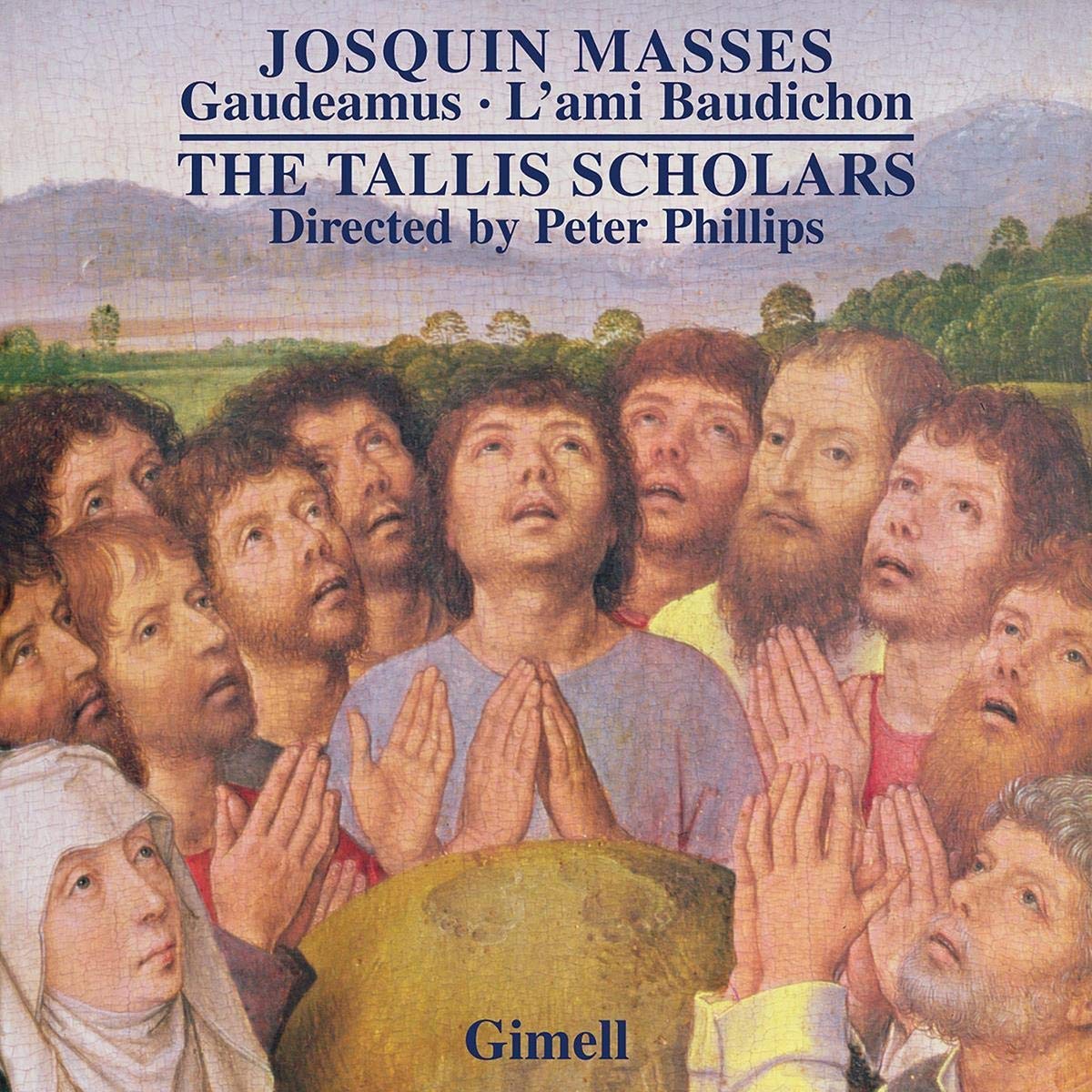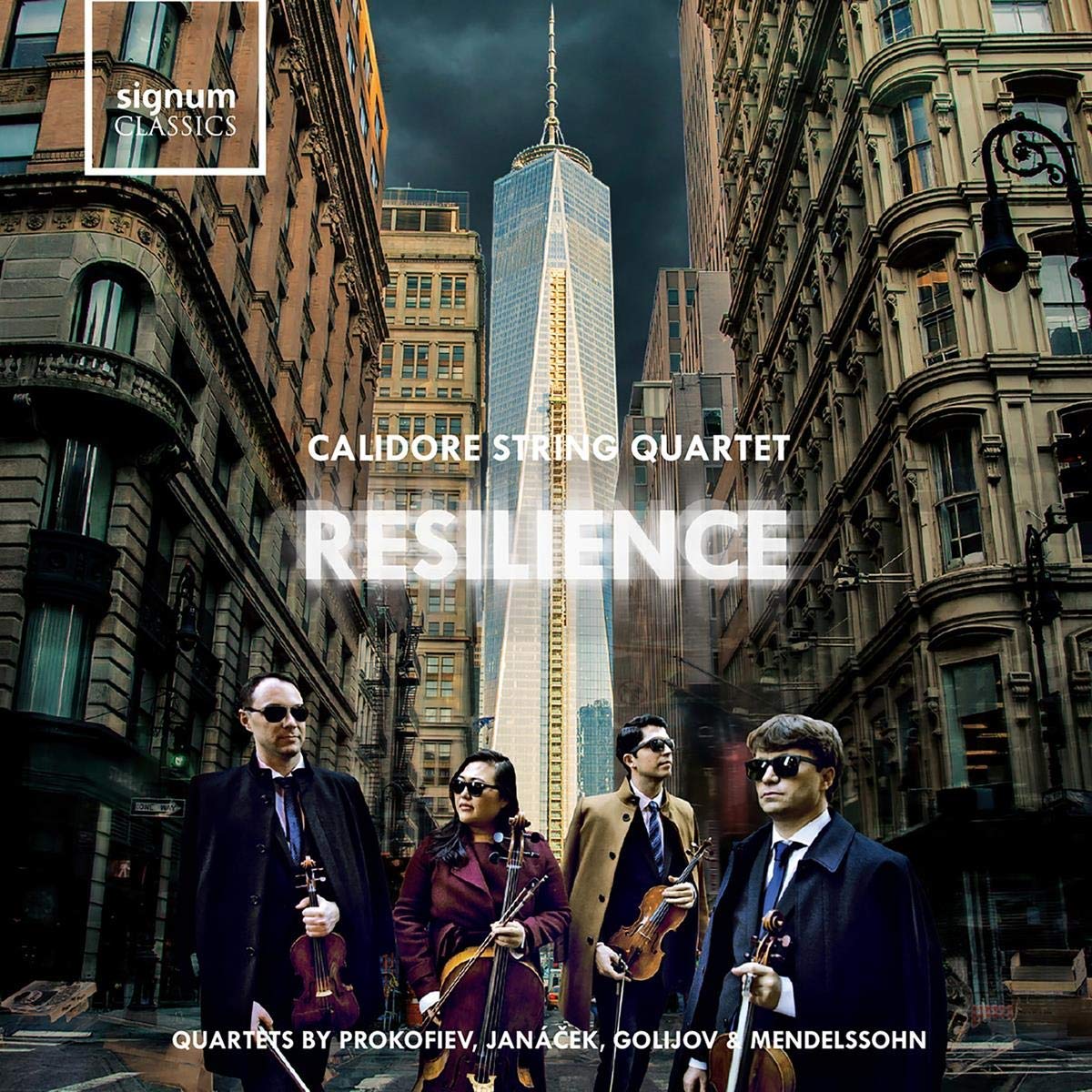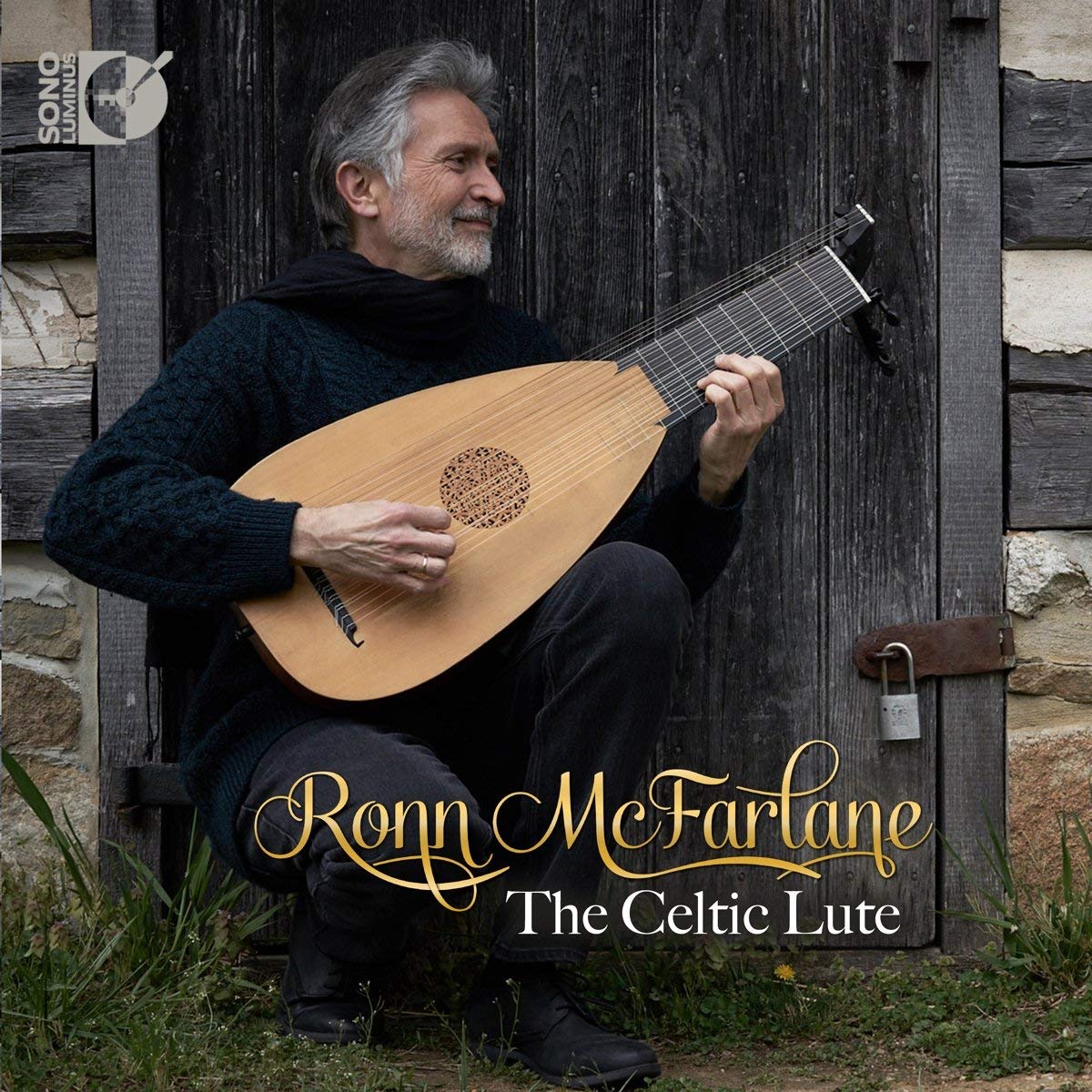Classical CDs Weekly: Josquin, Calidore String Quartet, Ronn McFarlane | reviews, news & interviews
Classical CDs Weekly: Josquin, Calidore String Quartet, Ronn McFarlane
Classical CDs Weekly: Josquin, Calidore String Quartet, Ronn McFarlane
Renaissance choral music and dramatic string quartets, plus a solo disc from a master lutenist

 Josquin: Missa Gaudeamus, Missa L’ami Baudichon The Tallis Scholars/Peter Phillips (Gimell)
Josquin: Missa Gaudeamus, Missa L’ami Baudichon The Tallis Scholars/Peter Phillips (Gimell)
That music composed in the 14th and 15th centuries can be enjoyed and performed today is mind-boggling. As is looking at one of Josquin des Préz’s manuscripts, close enough to conventional modern notation for even a hick like me to get an inkling of what the music might sound like. This latest Tallis Scholars release features two contrasting Masses, the mature Missa Gaudemas’s intensity set against the earlier, breezier Missa L’ami Baudichon. Peter Phillips has his three tenors sing the plainchant Gaudeamus omnes before the corresponding mass begins, allowing us to hear how the chant’s opening notes infuse much of what follows. It's like seeing a simple line drawing transformed into a Renaissance painting. The singing is technically assured and full of warmth; these performers know their stuff and want to share it with us. Listen carefully to the closing “Agnus” and hear how cleverly Josquin uses fragments of the melody (which is printed in Gimell’s booklet). Delicious.
The Missa l’ami Baudichon is lighter in tone, much of it based on the melody of a simple French folk tune. Phillips refers the original’s “vulgar reference”, which you can read for yourself in the second line of the song, printed in full under the plainchant. Hmm. It didn't put Josquin off, and this mass is delightful. Moments like the brief final section of the Kyrie have a delicious swing. And Phillips rightly highlights the closing part of the Credo, tenors blasting out an improbably sustained high G as the other parts swirl around them. Impeccably recorded, with full texts and translations too.
 Resilience – Music by Golijov, Janáček, Mendelssohn and Prokofiev Calidore String Quartet (Signum)
Resilience – Music by Golijov, Janáček, Mendelssohn and Prokofiev Calidore String Quartet (Signum)
Resilience could be filed alongside guitarist Sean Shibe’s last disc, both self-avowed artistic responses to recent global events. Here we get string quartets from “composers who endeavoured to create great art despite tremendous internal or external conflict.” The extent to which a composer’s personal circumstances affect how we listen to their music is a can of worms I won't open here; suffice to say that this quartet, formed in Los Angeles in 2010, deliver thrilling performances of four works which deserve to be far better known. Weightiest is Mendelssohn’s astonishing final quartet, an electrifying, visceral outburst of grief prompted by the sudden death of his sister Fanny. The mercurial energy which infuses pieces like the Octet is still present, though the mood is far darker, the quartet's scherzo terrifying in places. Mendelssohn’s slow movement offers some respite, though the work ends bleakly. Wisely, it's placed last on this disc – you wouldn't want to follow it with anything but silence. Janáček’s Quartet No 1 carries a similar emotional charge, and it's remarkable how vocal the Calidore players sound, the abrupt mood swings and changes of colour deftly handled. Those ponticello whisperings near the start of the second movement should give listeners the heebie jeebies.
Prokofiev's Quartet No 2 was written in the early 1940s, after its composer had been relocated from Moscow to the Kabardino-Balkar Republic, 900 miles south. Influenced by indigenous folk music it still sounds very much like vintage Prokofiev. Lyricism and spikiness are nicely balanced here, the dash to the finish thrillingly assertive. There's also Osvaldo Golijov’s Tenebrae from 2000, a 15-minute piece with a dark centre framed by music of winning serenity. Superb, rhythmically alert playing, the players’ collective virtuosity always at the service of the music.
 Ronn McFarlane: The Celtic Lute (Sono Luminus)
Ronn McFarlane: The Celtic Lute (Sono Luminus)
Robert Aubry Davis's entertaining booklet note has some interesting things to say about what we define as Celtic, and this lovely collection narrows its focus down to music from Scotland and Ireland. There's a history of shared heritage between the two countries, but Davis stresses that the two musics aren’t “a single common recipe using slightly different ingredients… Irish stew is not haggis.” If pushed, one might suggest that Scottish folk music is characterised by its use of the pentatonic scale and a rhythmic snap derived from Scots Gaelic speech patterns. Much Scottish lute music has been preserved in manuscripts dating back to the 17th century. Which isn't the case with Irish repertoire, and it's fascinating to learn that we've a Cork-born Chicago police captain to thank for preserving much of it: one Francis O’Neill began publishing folk and dance tunes in the early 20th century.
Lutenist Ronn McFarlane has been performing this repertoire since the 1980s. He gives us 26 short numbers here, in performances notable for their purity and restraint. There’s plenty of sparkle to the faster pieces (sample “Cliffs of Moher”) and grave beauty to the sparer ones: “The Seas are Deep” is a joy. Some of the song titles are worth the album price alone (“Hey My Nanny & Guzzle Together” a particular favourite), though information on specific tracks isn't provided. I'm not complaining. Sono Luminus's engineering is unobtrusively impressive.
- The Calidore String Quartet on the special circumstances of recording Resilience
- Read more of Graham Rickson's Classical CDs Weekly on theartsdesk
Explore topics
Share this article
The future of Arts Journalism
You can stop theartsdesk.com closing!
We urgently need financing to survive. Our fundraising drive has thus far raised £49,000 but we need to reach £100,000 or we will be forced to close. Please contribute here: https://gofund.me/c3f6033d
And if you can forward this information to anyone who might assist, we’d be grateful.

Subscribe to theartsdesk.com
Thank you for continuing to read our work on theartsdesk.com. For unlimited access to every article in its entirety, including our archive of more than 15,000 pieces, we're asking for £5 per month or £40 per year. We feel it's a very good deal, and hope you do too.
To take a subscription now simply click here.
And if you're looking for that extra gift for a friend or family member, why not treat them to a theartsdesk.com gift subscription?
more Classical music
 BBC Proms: Akhmetshina, LPO, Gardner review - liquid luxuries
First-class service on an ocean-going programme
BBC Proms: Akhmetshina, LPO, Gardner review - liquid luxuries
First-class service on an ocean-going programme
 Budapest Festival Orchestra, Iván Fischer, Edinburgh International Festival 2025 review - mania and menuets
The Hungarians bring dance music to Edinburgh, but Fischer’s pastiche falls flat
Budapest Festival Orchestra, Iván Fischer, Edinburgh International Festival 2025 review - mania and menuets
The Hungarians bring dance music to Edinburgh, but Fischer’s pastiche falls flat
 Classical CDs: Hamlet, harps and haiku
Epic romantic symphonies, unaccompanied choral music and a bold string quartet's response to rising sea levels
Classical CDs: Hamlet, harps and haiku
Epic romantic symphonies, unaccompanied choral music and a bold string quartet's response to rising sea levels
 Kolesnikov, Tsoy / Liu, NCPA Orchestra, Chung, Edinburgh International Festival 2025 review - transfigured playing and heavenly desire
Three star pianists work wonders, and an orchestra dazzles, at least on the surface
Kolesnikov, Tsoy / Liu, NCPA Orchestra, Chung, Edinburgh International Festival 2025 review - transfigured playing and heavenly desire
Three star pianists work wonders, and an orchestra dazzles, at least on the surface
 BBC Proms: Láng, Cser, Budapest Festival Orchestra, Iván Fischer review - idiomatic inflections
Bartók’s heart of darkness follows Beethoven’s dancing light
BBC Proms: Láng, Cser, Budapest Festival Orchestra, Iván Fischer review - idiomatic inflections
Bartók’s heart of darkness follows Beethoven’s dancing light
 Weilerstein, NYO2, Payare / Dueñas, Malofeev, Edinburgh International Festival 2025 review - youthful energy and emotional intensity
Big-boned Prokofiev and Shostakovich, cacophonous López, plus intense violin/piano duo
Weilerstein, NYO2, Payare / Dueñas, Malofeev, Edinburgh International Festival 2025 review - youthful energy and emotional intensity
Big-boned Prokofiev and Shostakovich, cacophonous López, plus intense violin/piano duo
 theartsdesk at the Three Choirs Festival - Passion in the Cathedral
Cantatas new and old, slate quarries to Calvary
theartsdesk at the Three Choirs Festival - Passion in the Cathedral
Cantatas new and old, slate quarries to Calvary
 BBC Proms: Estonian Philharmonic Chamber Choir, Kaljuste review - Arvo Pärt 90th birthday tribute
Stillness and contemplation characterise this well sung late-nighter
BBC Proms: Estonian Philharmonic Chamber Choir, Kaljuste review - Arvo Pärt 90th birthday tribute
Stillness and contemplation characterise this well sung late-nighter
 BBC Proms: Kholodenko, BBCNOW, Otaka review - exhilarating Lutosławski, underwhelming Rachmaninov
Polish composers to the fore in veteran conductor’s farewell
BBC Proms: Kholodenko, BBCNOW, Otaka review - exhilarating Lutosławski, underwhelming Rachmaninov
Polish composers to the fore in veteran conductor’s farewell
 theartsdesk at the Pärnu Music Festival 2025 - Arvo Pärt at 90 flanked by lightness and warmth
Paavo Järvi’s Estonian Festival Orchestra still casts its familiar spell
theartsdesk at the Pärnu Music Festival 2025 - Arvo Pärt at 90 flanked by lightness and warmth
Paavo Järvi’s Estonian Festival Orchestra still casts its familiar spell
 BBC Proms: Batsashvili, BBC Scottish Symphony Orchestra, Ryan Wigglesworth review - grief and glory
Subdued Mozart yields to blazing Bruckner
BBC Proms: Batsashvili, BBC Scottish Symphony Orchestra, Ryan Wigglesworth review - grief and glory
Subdued Mozart yields to blazing Bruckner
